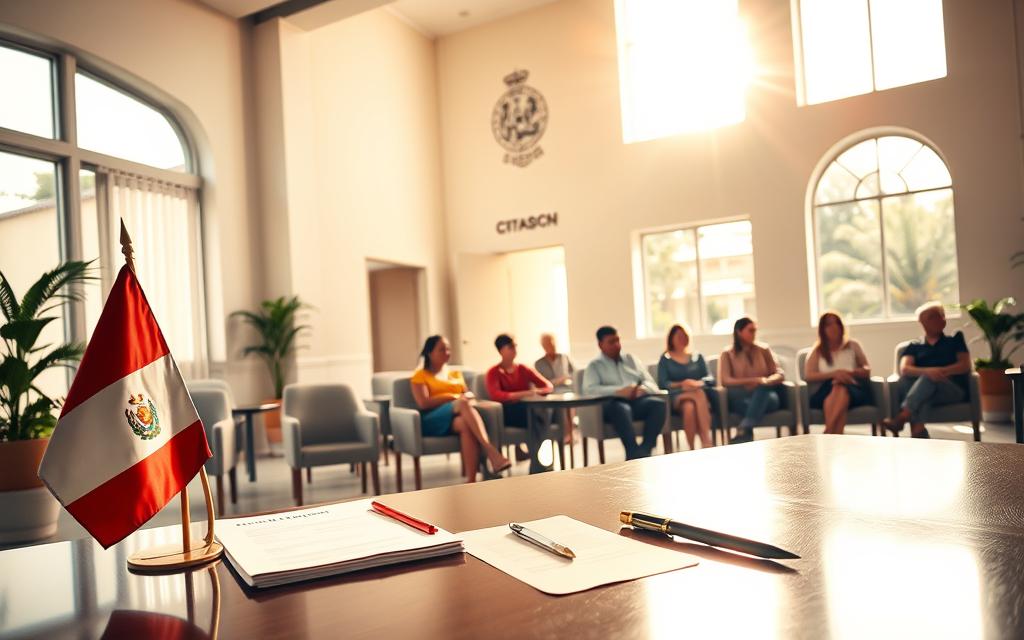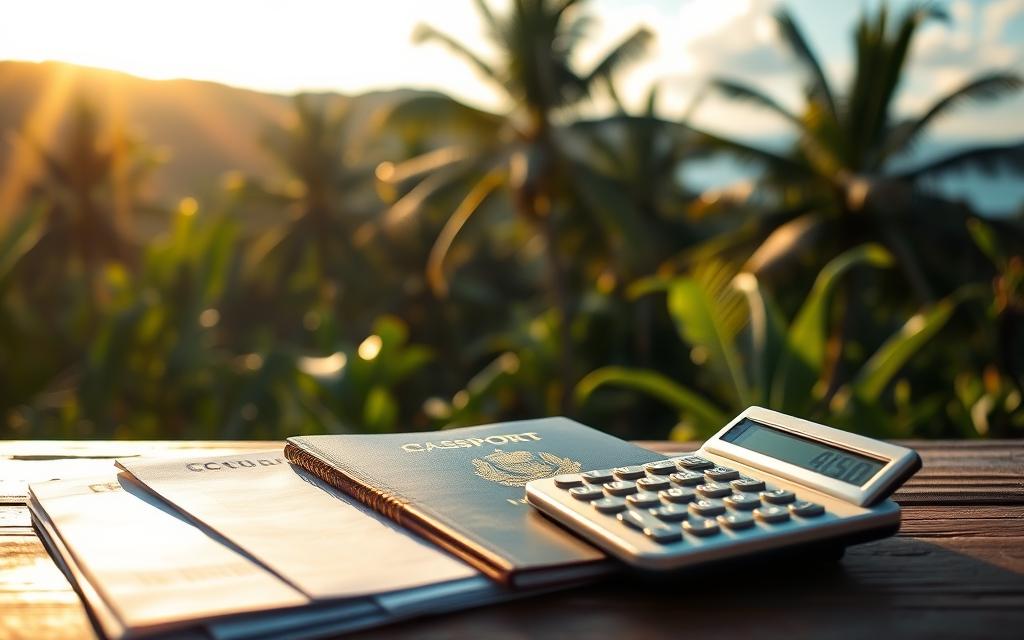"How much does it cost to become a citizen of Costa Rica?"

Costa Rica has emerged as a highly desirable destination for individuals and families seeking a better quality of life and new opportunities. With its natural beauty, mild climate, and rich culture, this Central American country is an attractive option for those looking to settle permanently or temporarily.
Acquiring Costa Rican citizenship offers numerous benefits, including access to quality healthcare, education, and economic opportunities. As nearly 70,000 Americans call Costa Rica home, growing by 14% annually since 2020, understanding the costs associated with citizenship and residency is increasingly important.
We will explore the comprehensive costs associated with obtaining Costa Rican citizenship, from government fees to hidden expenses, and examine the key differences between residency and citizenship to help determine which status aligns with your long-term goals.
Understanding Costa Rican Citizenship: The Path and Value
The journey to becoming a Costa Rican citizen involves more than just living in the country; it requires a deep understanding of the rights and responsibilities associated with citizenship. As we explore the path to Costa Rican citizenship, it's essential to distinguish between residency and citizenship, two concepts that are often confused but have distinct implications.
The Difference Between Residency and Citizenship
Residency in Costa Rica is a temporary status that requires periodic renewal, whereas citizenship is a permanent status that provides complete legal rights within the country. While residency offers certain privileges, citizenship grants unrestricted rights to live, work, and participate in the political process. Understanding this difference is crucial for individuals considering making Costa Rica their home.
Benefits of Costa Rican Citizenship
Costa Rican citizenship offers numerous benefits, including unrestricted work rights, voting privileges, and visa-free travel to over 130 countries worldwide. Citizenship also provides a level of security and permanence that residency cannot, including protection from deportation and the ability to pass citizenship to children. By becoming a Costa Rican citizen, individuals can deepen their commitment to Costa Rican culture and society.
Understanding the value proposition of Costa Rican citizenship helps applicants determine if the investment of time and money aligns with their long-term goals. For many expatriates, the journey from residency to citizenship represents a significant step towards fully integrating into Costa Rican life.
Costa Rica's Approach to Immigration and Citizenship
Unlike many countries offering citizenship by investment, Costa Rica takes a different approach to granting nationality. As of April 2025, Costa Rica does not have an official "Citizenship by Investment" program that grants immediate nationality in exchange for a monetary contribution or investment.
No Direct Citizenship by Investment Program
Costa Rica's immigration system is designed to attract long-term residents who contribute to the country's society and economy, not just investors seeking a passport. This approach requires foreign nationals, including investors, to follow the traditional naturalization route, which involves obtaining residency before applying for citizenship.
The Residency-to-Citizenship Pathway
The residency-to-citizenship pathway in Costa Rica typically takes 7+ years, reflecting the country's emphasis on integration and commitment. This pathway is designed to ensure that applicants have a genuine connection to the country through extended residency. Understanding this fundamental approach is essential for setting realistic expectations about the timeline and requirements for becoming a Costa Rican citizen.
Residency Options: Your First Step Toward Citizenship
Costa Rica offers various pathways to residency, which is the initial step toward obtaining citizenship. The country provides a range of residency options to cater to different needs and circumstances.
To start your journey to citizenship, you must first choose the most suitable residency category. The most common options include Pensionado, Rentista, Inversionista, and the newer Digital Nomad visa.
Pensionado (Retiree) Residency
The Pensionado program is designed for retirees, requiring proof of a permanent monthly income of at least $1,000 from a pension, retirement fund, or Social Security. This category is ideal for those with stable income sources.
Rentista (Fixed Income) Residency
The Rentista program is suited for individuals with steady passive income who are not yet retired. Applicants must show proof of stable monthly income of at least $2,500 for two years or a $60,000 deposit in a Costa Rican bank.
Inversionista (Investor) Residency
The Inversionista program targets those willing to make significant investments in Costa Rica. A minimum investment of $150,000 in a Costa Rican business, property, or government-approved project is required.
Digital Nomad Visa
The Digital Nomad visa allows remote workers to live in Costa Rica temporarily. Applicants must provide proof of stable income of at least $3,000/month for individuals or $4,000/month for families.
Each residency category has specific documentation requirements, application procedures, and renewal conditions. Choosing the right initial residency category can impact your path to citizenship, including potential restrictions and benefits.
How Much Does It Cost to Become a Citizen of Costa Rica?
The path to becoming a Costa Rican citizen involves several costs that applicants must be aware of. Understanding these expenses is crucial for budgeting and planning. The costs associated with Costa Rican citizenship vary depending on the residency category chosen.
Initial Investment Requirements
The initial investment required for Costa Rican citizenship varies significantly based on the type of residency. For instance, the Inversionista pathway requires a minimum investment of $150,000 in Costa Rican real estate, businesses, or approved projects. This represents the largest upfront cost among the residency options. For Rentista applicants, the financial requirement is either proving $2,500 monthly income or depositing $60,000 in a Costa Rican bank account. Pensionado applicants need to demonstrate a monthly pension income of at least $1,000.
Government Fees and Official Expenses
Beyond the initial investment, applicants must consider government fees associated with the citizenship process. These include application filing ($50), residency approval ($100), document certification ($30 per document), and DIMEX card issuance ($123). The total government fees typically range from $400 to $600 for the initial residency application. Additionally, applicants must pay the CAJA Monthly Premium, which ranges from $60 to $300 based on income, throughout their residency period. For more information on the residency process, you can visit https://www.jaroscr.com/is-residency-in-costa-rica-worth-it/.
Understanding these core financial requirements is essential for properly budgeting for your citizenship journey in Costa Rica. By breaking down the costs into initial investments and ongoing government fees, applicants can better prepare for the financial commitment required.
Additional Costs Most Applicants Overlook

Beyond the official fees, becoming a Costa Rican citizen involves various additional expenses that can significantly impact your budget. While government fees are a significant part of the overall cost, there are other expenditures that applicants often fail to consider.
Legal and Professional Services
One of the largest additional expenses is legal and professional services. Attorney fees for assistance with the citizenship process can range from $600 for basic services to $5,000 for comprehensive representation throughout the multi-year process. It's essential to factor in these costs when planning your application, as professional guidance can significantly improve the chances of a successful outcome. For more information on the overall process, you can visit .
Document Preparation and Authentication
Document preparation costs are another significant expense. These include obtaining original documents from your home country, apostille certification ($50-100 per document), official Spanish translations ($30-60 per page), and secure international shipping ($100-200). Ensuring that your documents are properly prepared and authenticated is crucial for a smooth application process.
Travel and Accommodation Expenses
Many applicants underestimate the travel expenses associated with the citizenship process. Multiple trips to San José for appointments, interviews, and document submissions can be required, resulting in significant costs for flights, accommodation, and other travel-related expenses. It's advisable to budget for these expenses to avoid unexpected financial strain.
To cover these often-unexpected expenses, we recommend budgeting an additional $3,000-$5,000 beyond the official fees. This will help ensure that you are prepared for the total cost of becoming a Costa Rican citizen.
Healthcare Costs and CAJA Requirements
As you navigate the path to Costa Rican citizenship, understanding the healthcare requirements is crucial. Costa Rica's universal healthcare system, known as Caja Costarricense de Seguro Social (CAJA), is mandatory for most residents.
Mandatory CAJA Enrollment
All residents of Costa Rica, except Digital Nomad visa holders, must enroll in CAJA. This enrollment is not optional and must be maintained throughout your residency period to remain eligible for citizenship. For more information on the implications of dual citizenship, you can visit dual.
Monthly Premium Calculations
Monthly CAJA premiums typically range from $60 to $300, calculated based on your declared income, usually between 7-11% of reported income. While this represents an ongoing expense, it provides comprehensive healthcare coverage without copays or deductibles, offering excellent value compared to healthcare costs in many other countries.
Understanding and budgeting for these healthcare costs is essential, as failure to maintain CAJA payments can jeopardize your residency status and citizenship eligibility. By considering these costs, you can better plan your path to Costa Rican citizenship.
The Complete Citizenship Application Process
To successfully navigate the Costa Rican citizenship application process, applicants must understand the various steps involved. The process begins with gathering and authenticating all required documents from your home country, including birth certificates, police clearance reports, and financial documentation.
Document Collection and Authentication
All documents must be properly apostilled or legalized by your home country's authorities and then professionally translated into Spanish by certified translators in Costa Rica. This step is crucial in ensuring that your application is processed without delays.
Residency Application Submission
The residency application submission involves scheduling an appointment with Costa Rica's immigration office (DGME), paying application fees, and providing biometric data. For more information on obtaining residency in Costa Rica, you can visit
Timeline from Residency to Citizenship
After receiving temporary residency, you must maintain your status for at least 7 years (5 years for those married to Costa Ricans) before becoming eligible for citizenship. The citizenship application itself typically takes 12-18 months for processing after submission.
Understanding this timeline is crucial for planning your long-term stay in Costa Rica, as the entire process from initial residency application to citizenship typically takes 8-9 years.
Eligibility Requirements for Naturalization
To become a citizen of Costa Rica, applicants must meet specific eligibility requirements. These requirements are crucial for a successful application through naturalization.
Residency Period Requirements
The residency period is a critical factor in determining eligibility for Costa Rican citizenship. Typically, applicants must have resided in Costa Rica for 7 years. However, this period is reduced to 5 years for those married to a Costa Rican citizen. It's essential to note that this requires actual physical presence in the country, as extended absences can negatively impact the residency period.
Language and Cultural Knowledge Tests
Applicants must demonstrate a basic understanding of the Spanish language and knowledge of Costa Rican culture, history, and government. This is assessed through formal tests that evaluate both written and verbal communication skills. The cultural knowledge test covers Costa Rican history, government structure, national symbols, and cultural traditions.
Good Conduct and Background Checks
A clean criminal record is mandatory for Costa Rican citizenship. Applicants must provide a certificate of good conduct from both Costa Rica and their country of origin, proving they have no disqualifying criminal history. For more information on the process, you can read about that lead to residency.
Dual Citizenship Considerations
As we explore the intricacies of Costa Rican citizenship, it's essential to understand the country's stance on dual nationality. Costa Rica's laws permit dual citizenship, offering flexibility for new citizens. This policy enables individuals to maintain their original nationality while enjoying the benefits of Costa Rican citizenship.
Costa Rica's Stance on Dual Nationality
Costa Rica fully recognizes and permits dual nationality, allowing new citizens to maintain their original citizenship and passport while also holding Costa Rican citizenship. This policy provides significant flexibility for international mobility, property ownership, and maintaining connections to your home country. For instance, individuals can travel more easily between countries, own property in both nations, and maintain cultural ties.
Implications for U.S. Citizens
For U.S. citizens, acquiring Costa Rican citizenship through dual nationality has several implications. While the U.S. allows dual citizenship, individuals must still comply with U.S. tax laws and reporting requirements. U.S. citizens are required to file annual tax returns, regardless of their residence. They may qualify for the Foreign Earned Income Exclusion and Foreign Tax Credits, potentially reducing their U.S. tax liability. For more detailed information, you can visit on Costa Rica's dual citizenship laws.
Common Challenges and How to Overcome Them
The journey to becoming a Costa Rican citizen involves overcoming several obstacles, from bureaucratic hurdles to document authentication issues. Navigating these challenges requires a thorough understanding of the process and strategic planning.
Bureaucratic Procedures
Costa Rica's bureaucratic procedures can be complex, involving multiple government departments and extensive paperwork. To navigate this system effectively, applicants may benefit from working with experienced immigration attorneys who understand the intricacies of the process.
Document Authentication Issues
Document authentication is a critical step in the citizenship application process. Ensuring that all documents are properly apostilled in the applicant's home country is essential to avoid delays or rejections.
Language Barriers
Language barriers present a significant challenge, as all official documentation must be in Spanish, and most government officials conduct business exclusively in Spanish. Developing basic Spanish language skills or working with professionals who can facilitate communication can greatly ease this challenge.
Understanding these potential roadblocks in advance allows applicants to prepare appropriately and minimize delays in their citizenship journey. By planning for extended timelines and working with experienced professionals, applicants can navigate the complexities of the Costa Rican citizenship process more effectively.
Tax Implications for New Citizens
As you navigate the process of becoming a Costa Rican citizen, it's essential to understand the tax implications that come with your new status. Costa Rica operates on a territorial tax system, meaning that citizens are generally only taxed on income earned within the country's borders.
Costa Rican Tax Obligations
New citizens must understand the various taxes they'll be subject to, including a 13% sales tax and property taxes, which are approximately 0.25% of the assessed value. If you're operating a local business, you'll also need to consider business tax obligations.
Home Country Tax Considerations
For U.S. citizens, obtaining Costa Rican citizenship doesn't eliminate the requirement to file U.S. tax returns, as the U.S. taxes its citizens on worldwide income regardless of residence. However, you may be eligible for the Foreign Earned Income Exclusion and Foreign Tax Credits to reduce double taxation. Additionally, if you have foreign bank accounts totaling over $10,000, you'll need to file FBAR reports.
It's crucial to consult with tax professionals familiar with both Costa Rican and your home country tax laws to ensure proper compliance and tax planning.
Conclusion
Costa Rica offers a unique pathway to citizenship that emphasizes integration and cultural adaptation. Throughout this article, we've explored the various facets of becoming a Costa Rican citizen, from the initial residency application to the final naturalization process.
The journey to Costa Rican citizenship is multifaceted, requiring a significant investment of both time and money. The total costs, including initial investments, government fees, professional services, and ongoing CAJA payments, can vary significantly based on the chosen residency pathway. However, for many, the benefits of Costa Rican citizenship, such as a high quality of life, an excellent healthcare system, and political stability, make the process worthwhile.
Costa Rica's approach to citizenship, which focuses on genuine connection through extended residency and cultural integration, differs from countries offering direct citizenship by investment programs. This approach ensures that new citizens are fully integrated into Costa Rican society.
For those considering this path, it's essential to understand the various residency options available, including rentista residency, investment residency, and permanent residency. Each option has its requirements and benefits, and choosing the right one is crucial for a successful application process.
In conclusion, becoming a Costa Rican citizen is a significant decision that requires careful planning and commitment. For personalized assistance with your residency and citizenship journey, contact Jaros CR at info@jaroscr.com or +(506)7182-8969, or visit www.jaroscr.com for more information.


